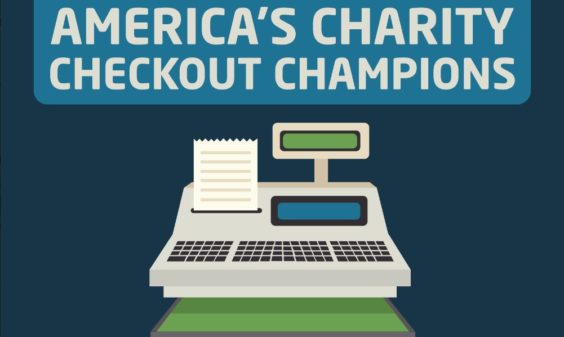
It’s a couponer’s dilemma – you hand over your stack of coupons, watch your total go down, down, down, and just as you’re admiring the final result, the cashier asks if you’d like to donate a few dollars for a cause.
But you did all that work to save as much as you possibly could – now your store wants you to voluntarily pay more? Do you decide to share some of your savings, or decline and keep all the fruits of your labor for yourself?
Whether we’re conflicted about it or not, a new report on charitable giving at the checkout says we’re still plenty generous. The organization Engage for Good (formerly known as the Cause Marketing Forum) says retailers raised at least $441 million from shoppers last year, on behalf of various charities. That’s up 4.5% from 2014, the last time the organization conducted its biannual study, and up 13% from 2012.
But will those numbers hold? By the time of the next biannual report, more of us may be grocery shopping online, using mobile payment apps, and simply growing weary of being asked to fork over ever more cash every time we buy anything.
Engage for Good tallied up the totals from 73 retailers that raised at least a million dollars each last year. And, you may be surprised to learn, eBay earned the top spot for the third time in a row. Its “eBay for Charity” campaign raised $56.5 million in the U.S. by asking sellers to donate a portion of their sales and asking buyers to make a voluntary donation to a charity of their choice.
Among physical retailers, Walmart and Sam’s Club were tops with their Miracle Balloon program, which raised $37 million for Children’s Miracle Network Hospitals. Petco, McDonald’s and Costco rounded out the top five. Grocery stores on the million-dollar-plus list include Publix, Meijer, Albertsons, Wegmans, Stop & Shop, Kroger and Giant Food Stores.
But Engage for Good predicts potentially worrying times ahead. The group found the increased level of donations to be “a surprisingly positive achievement given the doom-and-gloom of bankruptcy declarations, layoffs and store closings afflicting so many brick-and-mortar retailers.”
That’s the good news. The worrisome news, for charities at least, is that more of us are shopping online, and Engage for Good says its research “has not found a corresponding increase in (online retailers’) development of checkout charity initiatives”. And with the use of mobile payment technology increasing, the group implores retailers and charities to “get ahead of this trend” and make charitable donations via mobile easy and seamless.
And then there’s that ever-present challenge – a lot of shoppers simply don’t like to be asked to donate money while checking out. They either feel pressured and embarrassed into doing it, or feel judged and ashamed if they don’t.
In its last report, Engage for Good surveyed shoppers and found that 55% said they enjoy donating to charitable causes at the checkout. But that means nearly half don’t. The report cited Food Lion in particular as a retailer that stopped asking for charitable donations, based on customer feedback. Food Lion “serves primarily a low-income population and learned through customer surveys that their budget-conscious shoppers did not like being asked to donate at checkout,” the group found.
One way retailers can combat checkout charity fatigue is to give you something for your money. In 2014, a third of retailers used some type of incentive, like coupons, in exchange for donations. Last year, that percentage increased to 40%.
So if you’re concerned that routine pleas for donations will eat into your coupon savings, at least some of your money can go toward accumulating more coupons.
Love them or hate them, after raising more than $4.1 billion over three decades, Engage for Good says these types of checkout charitable campaigns aren’t going away. “Point-of-sale fundraising has become an accepted way for companies to engage their consumers and employees around a well-aligned social issue to actively reflect a company’s values,” the report concludes.
If you’d rather donate to your own causes on your own terms, there’s nothing wrong with saying no when asked to hand over a few more dollars when checking out. But if you do choose to give – the recipients of that $441 million will thank you for it.










